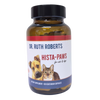You can tell if a pet has a strong immune system when they are happy, strong, have good muscles, grow well, reproduce successfully, and show positive behavior during exercise. These signs mean the animal's immune system works well and keeps them healthy.
The immune system acts as the body's defense and prevention mechanism against these harmful invaders, bacteria, viruses, or parasites. Accordingly, ensuring that this defense system remains strong and functions properly is essential.
Although maintaining a good and nutritious diet is vital for overall health, it may not always be sufficient to combat specific challenges. In some instances, invading infectious organisms can overpower the individual's immune system, causing illness or disease. In this article, you will learn all bout the immune system.
Common Signs of a Weakened Immune System in Dogs and Cats
Some signs to watch out for are losing weight without explanation or getting sick repeatedly. If you notice these things, taking your pet to the vet is a good idea. They can help figure out what's happening and how to help your furry friend feel better. You can keep your pet healthy and happy by paying attention to these symptoms and getting help when needed:
Frequent illnesses: A pet with a weakened immune system may experience illnesses more often than other animals. They might catch colds, infections or develop other health issues more frequently.
Slow recovery: Pets with weak immune systems may take longer to recover from illnesses, injuries, or surgeries. Their bodies may have a harder time fighting off infections and healing wounds.

Lethargy and decreased vitality: A pet with a weak immune system may appear passive, lacking energy, and less interested in activities. They may tire easily and show signs of fatigue or decreased enthusiasm.
Recurring infections: Some pets with weakened immune systems may suffer from recurring infections in the same area or system of the body. For instance, they may experience repeated ear infections, urinary tract infections, or respiratory issues.
Chronic inflammation: Pets with weak immune systems may develop chronic inflammation in certain parts of their bodies. This can manifest as joint inflammation (arthritis), inflammatory bowel disease, or persistent skin conditions.
Allergies and sensitivities: Pets with compromised immune systems might be more susceptible to allergies or develop new sensitivities. They may exhibit symptoms like excessive itching, redness, or gastrointestinal upset in response to certain foods, environmental triggers, or allergens.
Weight loss: Pets experiencing unexplained weight loss, even with a normal or increased appetite, may indicate a weakened immune system. Their bodies may face difficulties in maintaining a healthy weight.
5 Best Nutrients Immune Booster for Dogs and Cats
By ensuring that your furry companion receives a well-rounded mix of essential vitamins and minerals, you can effectively ward off many illnesses and diseases with five superstar micronutrients that can take your pet's immune system to the next level. By including these nutritional powerhouses in their diet, you're giving them the fighting chance they deserve to stay healthy and happy.
- Vitamin C
Role: Known for its immune-boosting properties, Vitamin C supports the production of white blood cells and helps the body absorb minerals.
Sources: Include fruits like oranges, strawberries, and blueberries in your dog's diet.

- Vitamin E
Role: Acts as a powerful antioxidant, promoting healthy skin, clear vision, and balanced cholesterol levels.
Sources: Foods like spinach, sweet potatoes, butternut squash, almonds, peanuts, and cashews are rich in Vitamin E.
Role: Have anti-inflammatory properties, supporting a healthy immune system and contributing to skin and coat health.
Sources: Fish oil, flaxseed oil, and fatty fish like salmon are excellent sources of omega-3 fatty acids.
- Zinc
Role: Essential for cell division and growth, zinc also supports muscle repair, liver health, and acts as an antioxidant in the body.
Sources: Include zinc-rich foods in your dog's diet, such as lamb, grass-fed beef, chickpeas, mushrooms, spinach, and chicken.
- Probiotics
Role: Support a healthy gut, which is closely linked to a strong immune system. Probiotics help maintain a balanced microbiome, preventing the overgrowth of harmful bacteria.
Sources: Consider feeding your dog yogurt, kefir, or providing probiotic supplements recommended by your veterinarian.
Conclusion
Recognizing signs of a weakened immune system, such as frequent illnesses, slow recovery, susceptibility to infections, and chronic inflammation, is essential for prompt intervention. Addressing these concerns by incorporating a balanced and nutritious diet enriched with immune-boosting micronutrients can significantly enhance your pet's immune function. Your furry companion receives a comprehensive blend of essential vitamins and minerals through a multivitamin supplement can be instrumental in fortifying their overall health. Five standout micronutrients, each with distinct health benefits, contribute significantly to elevating your pet's immune system.
















